- Home
- Elizabeth Gilbert
City of Girls Page 15
City of Girls Read online
Page 15
“I’d rather you . . . oh, never mind,” said Mr. Herbert—a man who always managed to be defeated before the battle had even begun.
Billy slowly paged through Mr. Herbert’s notebook. The silence was excruciating. Mr. Herbert stared at the floor.
“It looks as though these are just lists of jokes,” Billy said. “Not even jokes, all of them, but punch lines. And a lot of drawings of birds.”
Mr. Herbert shrugged in surrender. “If any better ideas should develop themselves, I’m hoping to be alerted.”
“The birds aren’t bad, anyway.” Billy set down the notebook.
I was feeling protective of poor Mr. Herbert, whose response to Billy’s teasing was to look even more tortured than usual, so I said, “Mr. Herbert, have you met Billy Buell? This is Peg’s husband.”
Billy laughed. “Oh, don’t you worry, girlie. Donald and I have known each other for years. He’s my attorney, actually—or used to be, when they still let him practice law—and I’m Donald Jr.’s godfather. Or used to be. Donald’s just feeling nervous because he knows I’ve arrived unannounced. He’s not sure how that’s going to go over with the upper-echelon management around here.”
Donald! It had never occurred to me that Mr. Herbert had a first name.
Speaking of upper-echelon management, at that very moment in walked Olive.
She took two steps into the kitchen, saw Billy Buell sitting there, opened her mouth, closed her mouth, and walked out.
We all sat in silence for a moment after she left. That had been quite an entrance—and quite an exit.
“You’ll have to excuse Olive,” said Billy at last. “She’s not accustomed to being this excited to see someone.”
Mr. Herbert put his forehead back down on the kitchen table and literally said, “Oh, moan, moan, moan.”
“Don’t worry about me and Olive, Donald. We’ll be fine. She and I respect each other, which makes up for the fact that we dislike each other. Or, rather, I respect her. So that’s something we share, at least. We have an excellent relationship based on a deep history of profound one-way respect, and plenty of it.”
Billy took out his pipe, scratched a match into flame with his thumbnail, and turned to me.
“How are your parents, Vivian?” Billy asked. “Your mother and the mustache? I always liked them. Well, I liked your mother. What an impressive woman, that one. She’s careful never to say anything nice about anyone, but I think she was fond of me, too. Don’t ever ask her if she likes me, of course. She’ll be forced by propriety to deny it. I never warmed to your father. Such a stiff man. I used to call him the Deacon—but only behind his back, of course, out of politeness. Anyway. How are they?”
“They’re doing well.”
“Still married?”
I nodded, but the question took me aback. It had never occurred to me that my parents could be anything but married.
“They never have affairs, do they—your parents?”
“My parents? Affairs? No!”
“That can’t hold much novelty for them, can it?”
“Umm . . .”
“Have you been to California, Vivian?” he asked, thankfully changing the subject.
“No.”
“You should come. You’d love it. They have the best orange juice. Also, the weather is outstanding. East Coast people like us do well out there. The Californians think we’re so refined. They give us the sun and the moon, just for classing up the joint. You tell them you went to boarding school and you’ve got Mayflower ancestors in New England, and you might as well be a Plantagenet, as far as they’re concerned. Come at them with a blue-blood accent like yours, and they’ll give you the keys to the city. If you can play a decent game of tennis or golf, that’s almost enough to get a man a career—unless he drinks too much.”
I was finding this to be a very quick-paced conversation for seven o’clock on the morning after my birthday festivities. I’m afraid I might have been just staring at him, blinking, but honestly, I was doing my best to keep up.
Also: did I have a blue-blood accent?
“How are you entertaining yourself around the Lily, Vivian?” he asked. “Have you found a way to be useful?”
“I sew,” I said. “I make costumes.”
“That’s smart. You’ll always find work in the theater if you can do that, and you’ll never age out of it. What you don’t want to be is an actress. What about your beautiful friend in there? Is she an actress?”
“Celia? She’s a showgirl.”
“That’s a tough gig. There’s something about a showgirl that always breaks my heart. Youth and beauty—they’re such a short lease, girlie. Even if you’re the most beautiful girl in the room right now, there are ten new beauties coming up behind you all the time—younger ones, fresher ones. While the older ones are rotting on the vine, still waiting to be discovered. But your friend, she’ll leave her mark while she can. She’ll destroy man after man in some great romantic death march, and maybe someone will write songs about her, or kill himself for her, but soon enough it will end. If she’s lucky, she might marry a rich old fossil—not that this fate is anything to envy. If she’s very lucky, her old fossil will die on the golf course one fine afternoon and leave her everything while she’s still young enough to enjoy it. The pretty girls always know it will end soon, too. They can feel how provisional it all is. So I hope she’s having a good time being young and beautiful. Is she having a good time?”
“Yes,” I said. “I think so.”
I didn’t know anybody who had a better time than Celia.
“Good. I hope you’re having a good time, too. People will tell you not to waste your youth having too much fun, but they’re wrong. Youth is an irreplaceable treasure, and the only respectable thing to do with irreplaceable treasure is to waste it. So do the right thing with your youth, Vivian—squander it.”
That’s when Aunt Peg walked in, bundled up in her plaid flannel bathrobe, her hair pointing in every direction.
“Pegsy!” cried Billy, leaping up from the table. His face was instantly bright with joy. All the nonchalance was gone in a heartbeat.
“Forgive me, sir, but your name escapes me,” said Peg.
But she was smiling, too, and in the next moment they were embracing. It wasn’t a romantic embrace, I would say, but it was robust. This was an embrace of love—or at least very strong feeling. They pulled back from the embrace and just looked at each other for a while, holding each other lightly by the forearms. When they stood like that together, I could see something profoundly unexpected, for the first time: I could see that Peg was kind of beautiful. I’d never noticed it before. She had such a shine on her face, looking at Billy, that it changed her whole countenance. (It wasn’t merely the reflected light off his good looks, either.) Standing in his radius, she looked like a different woman. I could see in her face a hint of the brave young girl who went off to France to be a nurse during the war. I could see the adventurer who’d spent a decade on the road with a cheap theatrical touring company. It wasn’t only that she suddenly looked ten years younger; she also looked like the most fun gal in town.
“I thought I’d pay you a visit, honey,” Billy said.
“So Olive informed me. You might have let me know.”
“I didn’t want to bother you. And I didn’t want you to tell me not to come. I figured it’d be best if I made my own arrangements. I have a secretary now, who takes care of everything for me. She made all the travel plans. Jean-Marie is her name. She’s bright, efficient, devoted. You’d love her, Peg. She’s like a female version of Olive.”
Peg pulled away from him. “Jesus, Billy, you never quit.”
“Hey, don’t be sore at me! I’m just teasing. You know I can’t help it. I’m just nervous, Pegsy. I’m afraid you’ll throw me out, honey, and I just got here.”
Mr. Herbert stood up from the kitchen table, said, “I’m going somewhere else now,” and left.
Peg took Mr. Herbert’
s seat and helped herself to a sip of his cold Sanka. She frowned at the cup, so I got up to make her a fresh cup of coffee. I wasn’t sure if I should even be in the kitchen at this sensitive moment, but then Peg said, “Good morning, Vivian. Did you enjoy your birthday celebration?”
“A bit too much,” I said.
“And you’ve met your Uncle Billy?”
“Yes, we’ve been talking.”
“Oh, dear. Be careful not to absorb anything he tells you.”
“Peg,” said Billy, “you look gorgeous.”
She ran a hand through her cropped hair and smiled—a big smile that settled deeply into her lined face. “That’s quite a compliment, for a woman like me.”
“There is no woman like you. I’ve checked into it. Doesn’t exist.”
“Billy,” she said, “give it a rest.”
“Never.”
“So what are you doing here, Billy? Do you have a job in the city?”
“No job. I’m on civilian furlough. I couldn’t resist making the trip when you told me Edna was here, and that you’re trying to make a good show for her. I haven’t seen Edna since 1919. Christ, I’d love to see her. I adore that woman. And when you told me you’d enlisted Donald Herbert to write the script, of all people, I knew I had to come back east and rescue you.”
“Thank you. That’s terribly kind of you. But if I needed rescue, Billy, I’d let you know. I promise. You’d be the fourteenth or fifteenth person I’d call.”
He grinned. “But still on the list!”
Peg lit a cigarette and handed it to me, then lit another one for herself. “What are you working on out there in Hollywood?”
“A bunch of nothing. Everything I write is proudly stamped NSA—No Significance Attempted. I’m bored. But they pay me well. Enough to keep me comfortable. Me and my simple needs.”
Peg burst out laughing. “Your simple needs. Your famously simple needs. Yes, Billy, you’re quite the renunciate. Practically a monk.”
“I’m a man of humble tastes, as you know,” said Billy.
“Himself, who comes to the breakfast table dressed like he’s about to be knighted. Himself, with his house in Malibu. How many swimming pools do you have now?”
“None. I just borrow Joan Fontaine’s.”
“And what does Joan get out of that arrangement?”
“The pleasure of my company.”
“Jesus, Billy, she’s married. She’s Brian’s wife. He’s your friend.”
“I love married women, Peg. You know that. Ideally, happily married ones. A happily married woman is the most solid friend a man could ever have. Don’t worry, Pegsy—Joan is just a pal. Brian Aherne is in no danger from the likes of me.”
I could not stop looking from Peg to Billy and back again, trying to imagine these two as a romantic couple. They didn’t look like they belonged together physically—but their conversation flickered so bright and sharp. The teasing, the jabs of knowing, the fullness of the attention they gave each other. The intimacy was more than obvious, but what were they, within that intimacy? Lovers? Friends? Siblings? Rivals? Who knew? I gave up trying to figure it out and just watched the lightning flash between them.
“I’d like to spend some time with you while I’m here, Pegsy,” he said. “It’s been too long.”
“Who is she?” Peg asked.
“Who is who?”
“The woman who just left you, which has caused you to feel so suddenly nostalgic and lonely for me. Come on, spill it: who was the latest Miss Billy to leave your side?”
“I’m insulted. You think you know me so well.”
Peg just gazed at him, waiting.
“If you must know,” said Billy, “her name was Camilla.”
“A dancer, I boldly predict,” said Peg.
“Ha! There’s where you’re wrong! A swimmer! She works in a mermaid show. We had a pretty serious thing going for a few weeks, but then she decided to take another path in life, and she no longer comes around.”
Peg started laughing. “A pretty serious thing, for a few weeks. Listen to you.”
“Let’s go out together while I’m here, Pegsy. Just you and me. Let’s go out and allow some jazz musicians to waste their talents on us. Let’s go to some of those bars we used to like, that close at eight o’clock in the morning. It’s no fun going out without you. I went to El Morocco last night and I found it so disappointing—filled with all the same people as ever, making all the same conversation as ever.”
Peg smiled. “Lucky for you that you live in Hollywood, where the conversation is so much more varied and engaging! But no, no, no. We shan’t be going out, Billy. I don’t have that kind of durability anymore. That kind of drinking isn’t good for me, anyhow. You know that.”
“Really? You’re telling me you and Olive don’t get drunk together?”
“You’re joking, but since you asked—no. Here’s how it works around here now: I try to get drunk and Olive tries to stop it from happening. It’s a good arrangement for me. Not sure what Olive gets out of it, but I’m awfully glad she’s there to be my guard dog.”
“Listen, Peg—at least let me help you with the show. You know that this pile of pages is a long way from being a script.” Billy tapped a manicured finger on Mr. Herbert’s dismal notebook. “And you know Donald can’t get it any closer to being a script, no matter how hard he tries. You can’t squeeze this out of him. So let me go at it with my typewriter and my big blue pencil. You know I can do this. Let’s make a great play. Let’s give Edna something worthy of her talents.”
“Shush.” Peg had put her hands over her face.
“Come on, Peg. Take a risk.”
“Hush,” she said. “I’m thinking at the top of my lungs.”
Billy hushed and waited her out.
“I can’t pay you,” she said, finally looking up at him again.
“I’m independently wealthy, Peg. That’s always been a talent of mine.”
“You can’t own the rights to anything that we make here. Olive won’t stand for it.”
“You can have all of it, Peg. And you might even make a nice lump of brass off this venture, too. If you’ll only let me write this show for you—and if it’s as good as I think it could be—why, you’ll make so much money, your ancestors will never have to work again.”
“You’ll have to put that in writing—that you’re not expecting to earn anything out of this. Olive will insist on it. And we’ll have to produce it on my budget, not yours. I don’t want to get tangled up with your money again. It never ends well for me. Those have to be the rules, Billy. It’s the only way Olive will let you stick around.”
“Isn’t it your theater, Peg?”
“Technically, yes. But I can’t do anything without Olive, Billy. You know that. She’s essential.”
“Essential but bothersome.”
“Yes, but you are only one of those things. I need Olive. I don’t need you. That’s always been the difference between you.”
“By God—that Olive! Such staying power! I never could understand what you saw in her—other than that she comes dashing to serve you whenever you have the smallest need. That must be the appeal. I never could offer you such loyalty, I suppose. Solid as furniture, that Olive. But she doesn’t trust me.”
“Yes. Precisely true on all counts.”
“Honestly, Peg—I don’t know why that woman doesn’t trust me. I’m very, very, very trustworthy.”
“The more ‘very’s’ you use, Billy, the less trustworthy you sound. You do know that, right?”
Billy laughed. “I do know that. But, Peg—you know that I can write this script with my left hand while playing tennis with my right hand and bouncing a ball off my nose like a trained seal.”
“Without spilling a drop of your booze in the process.”
“Without spilling a drop of your booze,” corrected Billy, lifting his glass. “I took this from your bar.”
“Better you than me at this hour.”
“I want to see Edna. Is she awake?”
“She doesn’t get up till later. Let her sleep. Her country is at war and she just lost her house and everything. She deserves some rest.”
“I’ll come back, then. I’ll head back to the club, take a shower, have a rest, come back later, and we’ll get started. Hey, thanks for giving my apartment away, I forgot to mention! Your niece and her girlfriend have stolen my bed and thrown their underwear all over my precious place that I never once used. It smells like a bomb went off in a perfume factory in there.”
“I’m sorry,” I began, but both of them waved at me dismissively, cutting me off. It obviously didn’t matter in the least. I’m not sure I mattered in the least, when Peg and Billy were so focused on each other. I was lucky I got to be sitting there at all. It occurred to me that I should just keep my mouth shut so I would get to stay.
“What’s her husband like, by the way?” Billy asked Peg.
“Edna’s husband? Apart from being stupid and talentless, he has no faults. I will say he’s alarmingly good-looking.”
“That, I knew. I’ve seen him act, if you can call it acting. I saw him in Gates of Noon. He’s got the vacant eyes of a milk cow, but he looked like a million bucks in his aviator scarf. What’s he like as a person? Is he faithful to her?”
“I’ve never heard otherwise.”
“Well, that’s a thing, isn’t it?” said Billy.
Peg smiled. “Yes, it’s a real marvel, isn’t it, Billy? Imagine! Fidelity! But yes, that’s a thing. So she could do worse, I suppose.”
“And probably will someday,” added Billy.
“She thinks he’s a great actor, is the problem.”
“He has offered the world no evidence of this fact. Bottom line—do we have to put him in the show?”
Peg smiled, ruefully this time. “It’s slightly disconcerting to hear you use the word ‘we.’”
“Why is that? I’m simply crazy about that word.” He grinned.
“Until the moment you stop being crazy about it, and you disappear,” she said. “Are you really part of this venture now, Billy? Or will you be on the next train back to Los Angeles as soon as you grow bored?”
“If you’ll have me, I’ll be part of it. I’ll be good. I’ll behave as if I’m on parole.”

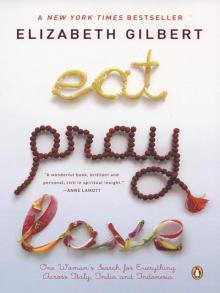 Eat, Pray, Love
Eat, Pray, Love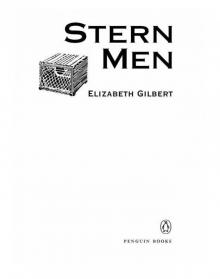 Stern Men
Stern Men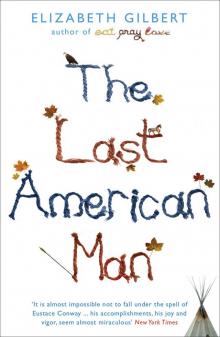 The Last American Man
The Last American Man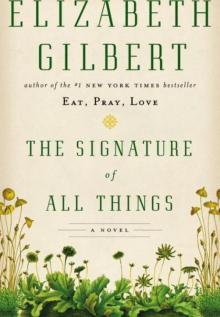 The Signature of All Things
The Signature of All Things City of Girls
City of Girls Pilgrims
Pilgrims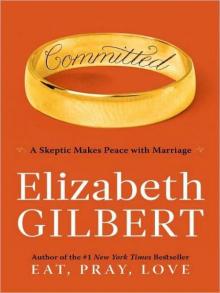 Committed: A Skeptic Makes Peace With Marriage
Committed: A Skeptic Makes Peace With Marriage Big Magic
Big Magic Committed
Committed The Best American Travel Writing 2013
The Best American Travel Writing 2013